Artificial Intelligence has a great demand in the healthcare industry. For now, 94% of healthcare providers, life science companies, and tech vendors use AI in some capacity. This number is crucial proof to demonstrate the benefits of AI in healthcare and how significant it is for the industry.
However, there are still some issues that are slowing down the adoption of AI in healthcare. One of them is the lack of experienced specialists, leading to development delays, mistakes, increased costs in healthcare. Healthcare providers turn to tech companies for expertise in adopting AI, and naturally, demand for such expertise makes competition among the latter highly intensive.
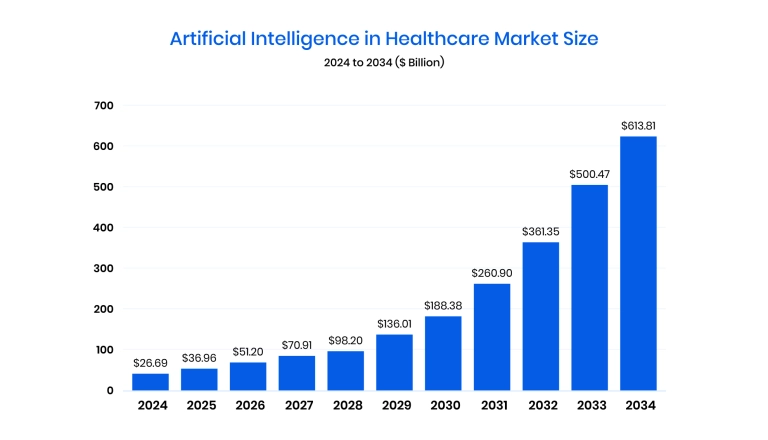
AI healthcare market overview
The global AI in the healthcare market was valued at .69 billion in 2024 and is expected to grow at a CAGR of 38.5% from 2023 to 2033. The healthcare AI market is experiencing a remarkable and significant surge in its growth and acceptance. Here are some facts about AI in healthcare:
- Healthcare is considered the second-largest industry for AI in 2024.
- North America dominates the market, accounting for over 54% of revenue as of 2024.
- The use of AI-powered medical imaging technologies is a significant trend among healthtech companies, with 76% of all AI-enabled medical devices authorized for sale in the US being those used in radiology.
- Medical businesses continue to grow and expand, so mergers and acquisitions are becoming very common. Larger players are acquiring smaller companies to enhance their AI capabilities or extend their market coverage.
- The integration of AI with complementary technologies like robotics or blockchain promotes precision medicine and transforms healthcare delivery.
- Generative AI-powered virtual assistants and chatbots are in high demand, with 47% of healthcare organizations already using or planning to implement them. These AI solutions can automate up to 30% of patient interactions, significantly reducing providers' administrative workload.
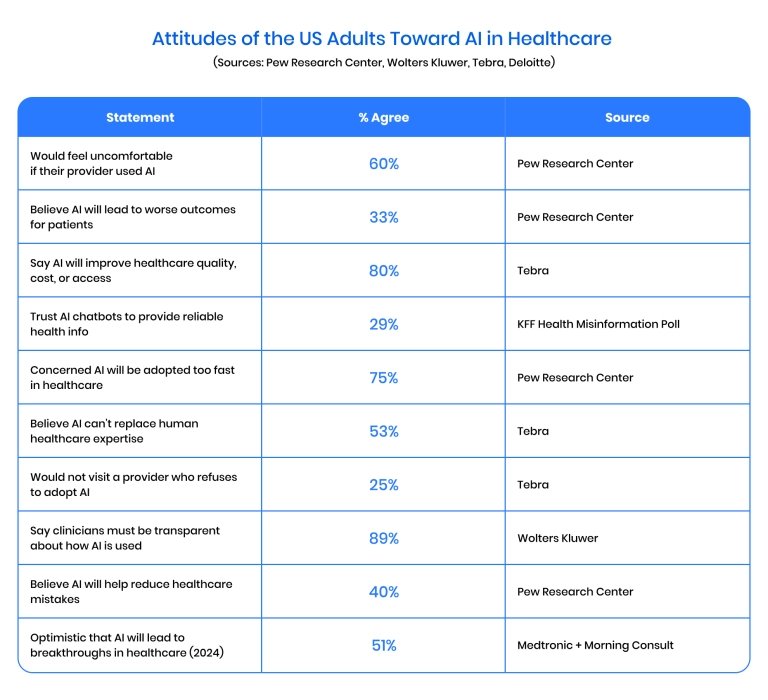
Take your software to new heights with AI and ML services
AI healthcare market segmentation: by application
By application of AI in healthcare, the top segments dominating are Robot-Assisted Surgery, Clinical Trials, and Connected Machines. Cybersecurity, Dosage Error Reduction, and Diagnostics are developing slower.
AI-powered robots make surgical procedures more precise. Complicated surgeries in cardiovascular or neurology need absolute accuracy, and AI robotics can ensure it. AI algorithms are also changing clinical trials processes. The power of rapid data analysis at every stage of clinical trials makes them more accurate, cost-effective, and patient-centric.
Besides, AI has a crucial role in using connected machines in healthcare. AI integrates data from IoT devices and sensors into a single healthcare system. This gives an opportunity to gather, exchange, and analyze huge amounts of data.
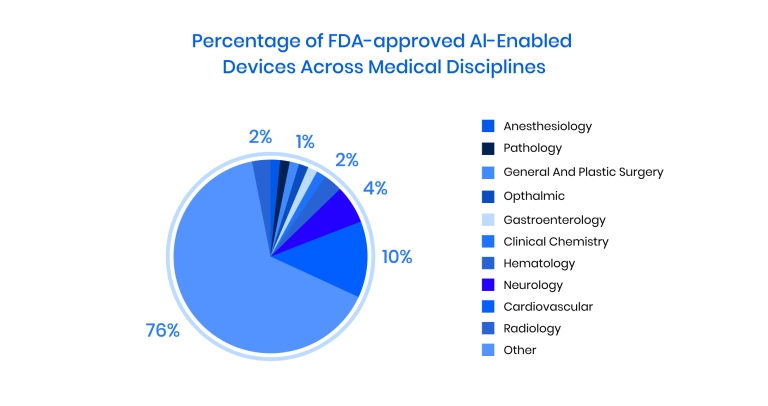
To understand which therapeutic areas have most AI support, let's take a look at the FDA-approved list of AI-enabled applications. For now, FDA approved a total of 950 medical devices using AI, and radiology has 76% of them. This report shows us that radiological imaging has become very promising and usable in practice.
All the applications mentioned above highlight how AI is rapidly advancing across multiple facets of healthcare, from operating rooms to patient monitoring and diagnostics. Let's explore how AI is transforming each of these areas in more detail:
Robot-assisted surgery
AI is now a standard in cardiovascular, neurological, and orthopedic surgery. It minimizes human error and ensures extreme precision.
There is a rising trend of AI-enabled robotic systems entering outpatient surgery centers, reducing recovery time and operational costs. 53% of EU healthcare organizations stated they plan to use medical robotics by the end of 2025.
Clinical trials
AI is revolutionizing how trials are designed and managed. It optimizes recruitment, data analysis, and adaptive protocols. In particular, it is increasingly used in decentralized trials with AI for remote patient participation and real-time analytics.
Connected machines
AI integrates data from ICU monitors, wearable tech, and in-home sensors to support early intervention. Next-generation AI systems are now enabling predictive hospital asset management to reduce ICU overloads. 72% of EU healthcare organizations plan to use AI for patient monitoring.
Diagnostics (imaging)
Diagnostics is the most established area of AI use in healthcare. AI helps interpret X-rays, CT scans, and MRIs more quickly and accurately.
Regulatory agencies have recently fast-tracked approvals for multimodal AI imaging tools that combine various scan types.
45% of Americans view GenAI as helpful in interpreting medical tests, X-rays, and other diagnostic images.
Dosage error reduction
AI tools aim to reduce prescribing mistakes through automated dose checks and alerts. Integration with clinical decision support systems (CDSS) is improving prescription safety in pilot programs.
Cybersecurity
AI monitors network traffic and detects anomalies to protect sensitive patient data. According to statistics of AI in healthcare, 83% of US consumers view AI's potential for error as a barrier, and 86% state they are concerned about transparency.
As of May 2025, the US Food and Drug Administration (FDA) has authorized 950 AI/ML-enabled medical devices for marketing in the US. This information is available on the FDA's official AI/ML-Enabled Medical Devices list .
Radiology continues to be the leading field, with a significant number of these devices designed to assist in imaging and diagnostic processes.
Looking ahead:
- Radiology will stay at the forefront, especially with real-time, multimodal imaging tools.
- AI in diagnostics beyond imaging (e.g., pathology, genomics) is set to grow at 35% CAGR over 5 years.
- Operational AI will become standard for scheduling, inventory, and billing.
AI healthcare market segmentation: by technology
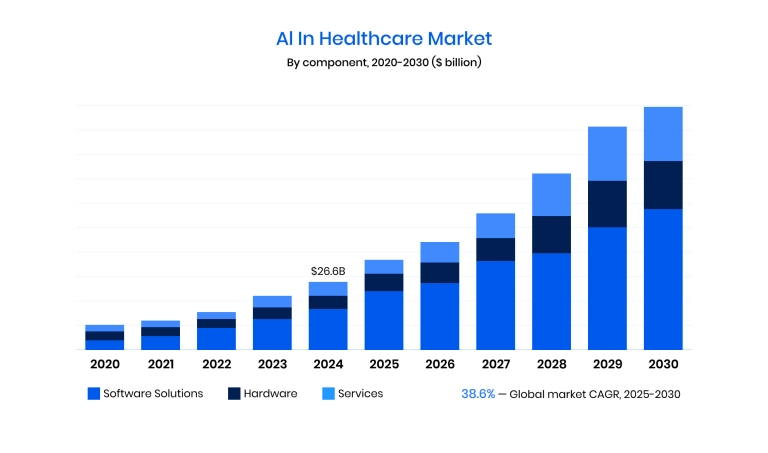
Based on components, the global AI in the healthcare market can be divided into software, hardware, and services. The software segment has the largest share and is expected to have the fastest growth.
This segment includes Machine Learning platforms, Natural Language Processing (NLP) and text analysis tools, Deep Learning Platforms, Computer Vision, Speech and Audio Recognition, Integrated Development environments (IDEs) and AI frameworks. Global trend of digital transformation, and capabilities of AI software solutions made it the leading component in healthcare.
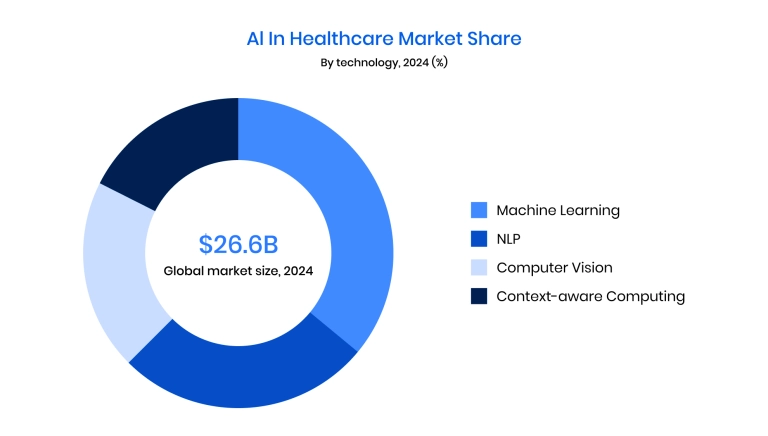
Finally, based on technology, the AI healthcare market can be divided into Machine Learning, Natural Language Processing (NLP), Computer Vision , and Context-Aware Computing. Machine Learning is a leader now, but NLP has the potential to be the market leader in the future. The AI in healthcare statistics shows the demand for analyzing human language data will soon be more than for images and contextual information.
Will adopting GenAI mark the next chapter for your business?
Download our free whitepaper now to find out.

4 drivers affecting rise of AI in healthcare
- The growing amount of medical data: According to the DATCON index, the healthcare data explosion will exceed 10 trillion gigabytes in 2025. Now AI algorithms can help operate it and give important insights.
- Emerging global issues: COVID-19 has become a litmus test for identifying problems in healthcare. Medical AI can enable healthcare providers to do more with less. Moreover, it can revolutionize AI and the healthcare market and pay more attention to prediction than treatment.
- Population aging: With the increase in life expectancy, people need more medical help and care. AI-enabled technologies can help people to live healthier and longer lives.
- Lack of medical staff: With a shortage of medical workers, the duties and burden on existing employees increase. That leads to mistakes and negatively affects performance and patient care. AI can help automate routine tasks and give new opportunities for treatment.
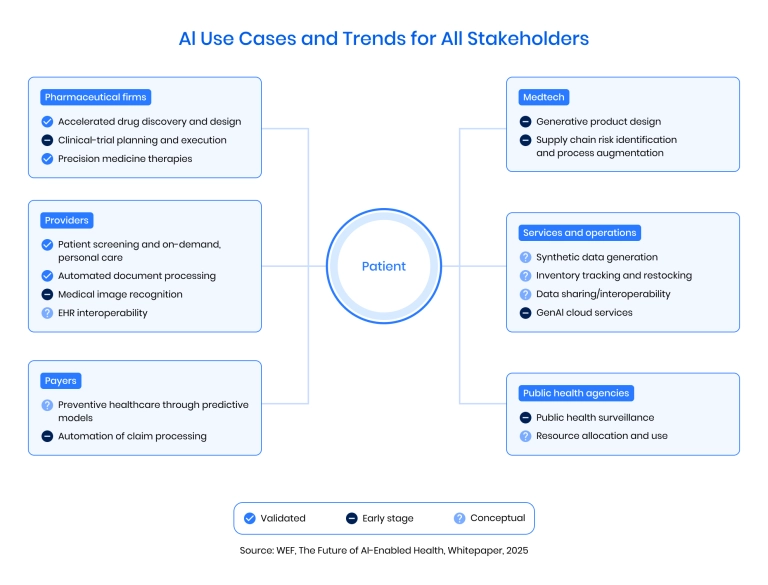
How to become FHIR-compliant
A detailed approach to FHIR implementation

Regional analysis
North America has a dominant position in the healthcare artificial intelligence market. Healthcare companies in the USA have great support from the government. Moreover, the public and private sectors have built a coordinated collaboration and managed to adopt AI technologies earlier.
The second-largest region in the AI healthcare market is Europe. Germany, the United Kingdom, France, Spain, Ireland, Switzerland, and Belgium are key players in life sciences. They are focusing on R&D activity and biotechnology drug discovery.
Asia-Pacific region is a quickly growing market and is expected to register a CAGR of 8.5% by 2028. Because of the rising geriatric population, medical tourism, and the growing research activities, Asian countries accelerated the adoption of medical AI.
The healthcare artificial intelligence market in South America is focusing on developing Remote Patient Monitoring (RPM) and telehealth. The Middle East and Africa will grow more slowly than other regions. Their focus is AI-based telehealth services and increasing collaborations between healthcare facilities.
Tech giants in a competitive landscape
Big tech giants have been accelerating their pursuit of the AI healthcare market for the last several years. They make collaborations, develop AI-powered solutions, and invest in AI startups intensively.
- Google is building its life science brand and actively uses AI for its purpose. DeepMind, the artificial intelligence company owned by Google, is the key player in this market. Google focuses on AI pharmaceutical R&D, radiology, and imaging. Also, it is interested in healthcare search and unstructured data analysis.
- Microsoft is a leader in health IT services. Azure Cloud is becoming the leading environment for enterprises' provider-focused software. Besides, Microsoft Corporation is competing to collect and sell medical data.
- Amazon has its HIPAA -appropriated cloud service for healthcare data processing. It is also focused on AI in precision medicine, medical supply chain, insurance, and care delivery.
- Apple holds the largest share of wearable devices. iPhone and Apple Watch are mainly used for gathering patients' data for further processing with AI. Besides, Apple's Health App offers a patient-doctor environment with multiple functions via iPhone.
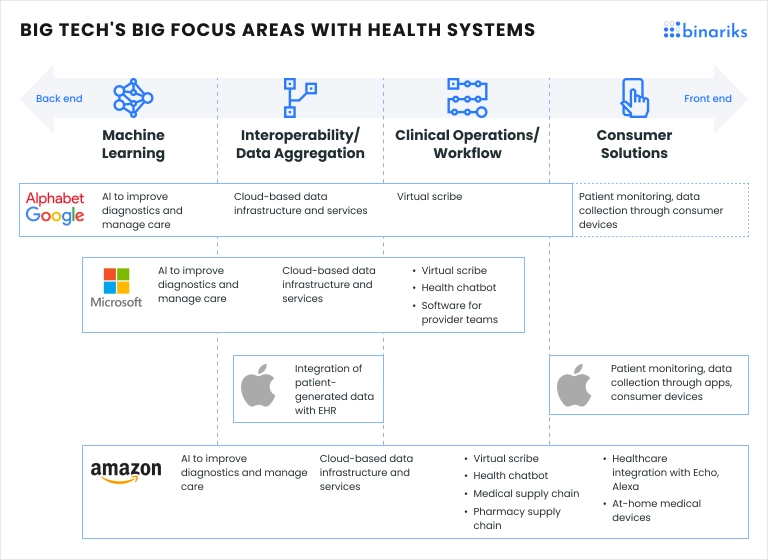
Conclusion
Statistics demonstrate the growing use of artificial intelligence in healthcare. We observe remarkable results, including growing trust in medical providers for AI and increasing interest from investors in developing AI-enabled healthcare solutions.
It appears that we can expect significant advancements soon. Still, with a lack of skilled specialists and inefficient cooperation between the public and private sectors, the journey remains complex and requires the right expertise.
With over 60 healthcare projects, Binariks is the partner of choice for providers, payers, and innovators ready to make AI work in real healthcare settings. Our AI Center of Excellence gives you access to cross-functional experts and a proven, business-first approach, ensuring safe, compliant, and impactful solutions.
See how our clients benefit: explore our case studies and discover how we help you overcome barriers, unlock new value, and lead in digital health innovation. Ready to move from uncertainty to competitive advantage? Contact Binariks to unlock what's possible with AI in healthcare.
FAQ
Share

